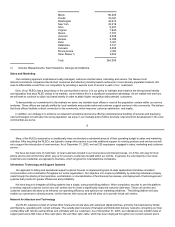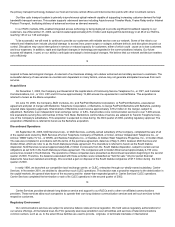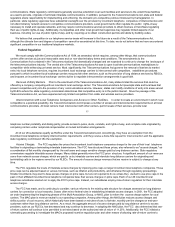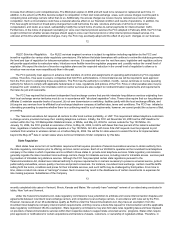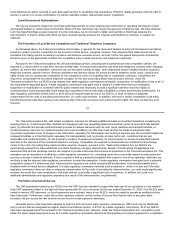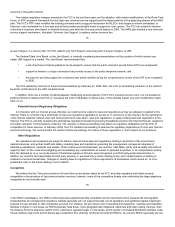FairPoint Communications 2003 Annual Report Download - page 16
Download and view the complete annual report
Please find page 16 of the 2003 FairPoint Communications annual report below. You can navigate through the pages in the report by either clicking on the pages listed below, or by using the keyword search tool below to find specific information within the annual report.
Our operating expenses are categorized as operating expenses; depreciation and amortization; and stock based compensation.
•Operating expenses include cash costs incurred in connection with the operation of our central offices and outside plant
facilities and related operations. In addition to the operational costs of owning and operating our own facilities, we also purchase
long distance services from RBOCs, large independent telephone companies and third party long distance providers. In
addition, our operating expenses include expenses relating to sales and marketing, customer service and administration and
corporate and personnel administration.
•Depreciation and amortization includes depreciation of our communications network and equipment. Prior to January 1, 2002,
and the implementation of SFAS No. 142, this category also included amortization of goodwill relating to our acquisitions.
•Stock based compensation consists of non-cash compensation charges incurred in connection with the employee stock options
granted to our executive officers, and stockholder appreciation rights agreements granted to two of our executive officers.
We intend to continue to pursue selective acquisitions:
•On December 1, 2003, we purchased all of the capital stock of CST and CCI. CST and CCI serve approximately 13,280
access line equivalents in central Maine.
•On June 18, 2003, we executed an agreement and plan of merger with Berkshire to merge FairPoint Berkshire Corporation
with Berkshire, pending required state regulatory approvals. Shareholders of Berkshire would receive approximately
$19.2 million in the merger, subject to adjustment. Berkshire is an ILEC that provides voice communication services to over
7,200 access line equivalents serving five communities in New York State. Berkshire's communities of service are adjacent to
Taconic Telephone Corp., one of the Company's subsidiaries. This acquisition is expected to close during the third quarter of
2004.
•During 2002, we made no acquisitions.
•During 2001, we acquired one RLEC and certain assets of additional telephone exchanges for an aggregate purchase price of
$24.2 million, which included $0.7 million of acquired debt. At the respective dates of acquisition, these businesses served an
aggregate of approximately 5,600 access lines.
We expect that a portion of our future growth will result from additional acquisitions, some of which may be material. We may not be
able to successfully complete the integration of the businesses we have already acquired or successfully integrate any businesses we might
acquire in the future. If we fail to do so, or if we do so at a greater cost than anticipated, or if our acquired businesses do not experience
significant growth, there will be a risk that our business may be adversely affected. In addition, we may need additional financing to continue
growing through acquisitions and such financing may be in the form of additional debt, which would increase our leverage. We may not be
able to raise sufficient additional capital at all or on terms that we consider acceptable.
Our acquisitions likely will be subject to federal, state and local regulatory approvals. We cannot assure you that we will be able to obtain
any necessary approvals, in which case a potential acquisition could be delayed or not consummated. For example, in June 2003, we
executed an agreement and plan of merger with respect to the Berkshire acquisition and we have not yet received the regulatory approvals
required to consummate that transaction.
23
In 2003, we did not recognize any material non-cash compensation charges, primarily due to the fact that the fair market value per share
of our common stock remained relatively stable.
In March 2002, we recognized a non-cash compensation benefit of $0.2 million associated with the reduction in estimated fair market
value of the stockholder appreciation rights agreements. In December 2002, an additional benefit of $0.1 million was recognized in
connection with these agreements. This benefit was offset by a non-cash compensation charge of $1.2 million in connection with the
modification of employee stock options by one of our executive officers.
In December 2001, we recognized a non-cash compensation charge of $2.2 million in connection with the modification of employee
stock options by one of our executive officers. This charge was offset by a non-cash compensation benefit of $0.9 million associated with the
reduction in estimated fair market value of the stockholder appreciation rights agreements.


